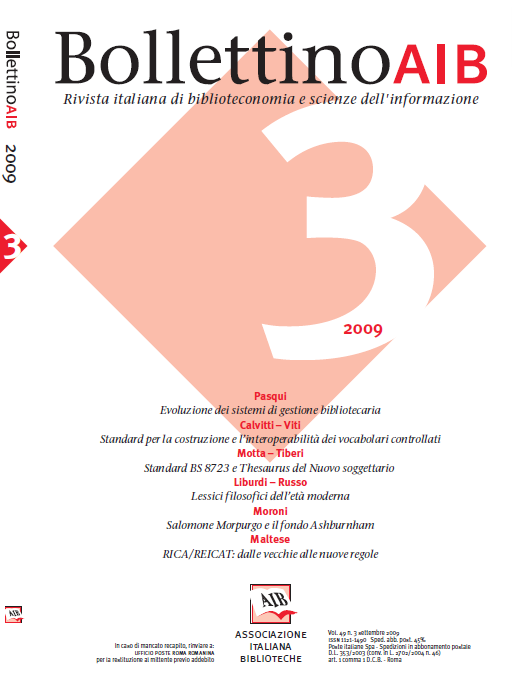Evolution of system for library management among old and new paradigms
Main Article Content
Abstract
The context in which libraries currently operate is marked by the immense growth of digital information, the pervasion of the web, the spread of specifically designed tools for promoting active participation of users and by applications based on the sharing and reuse of data and services. These tendencies are accompanied by changes in the sphere of Information and Communication Technology (ICT) and should not be judged either dogmatically or with suspicion, but examined and interpreted in the light and together with recent social changes and with the economic events that characterize the current world scene.
The development of “social networks”, “virtual communities” and “virtual businesses”, encouraged by mobility and permanent connectivity, make it essential to examine scenarios with potential that is yet to be discovered. In these scenarios forms of expression that differ from the textual document carry out a leading role and are established as new modes of creation, sharing, research and use of information in which the digital contents have an ever increasing leading role. Impacts on work, research and didactics are yet largely to be explored and propose new problems both with regard to the management, integration and use of the applications and with respect to reliability, management of rights, integrity and conservation of resources.
Taking its cue from the transformations of computer technology and from the evolution of library services, the document examines the move towards new relevant paradigms for the development of library services, including those regarding digital services, in order to guarantee their scalability, reliability and sustainability. The brief presentation of the most important emerging models is summed up by an illustration of projects and solutions that currently implement their principles. Lastly a series of guidelines are proposed for the creation of a network of modular interoperating and flexible services able to support users in their many activities and directed at the efficient use of the human and instrumental resources involved.
A debate should be developed for identifying lines of action, for defining projects aimed at the evolution of existing services and the creation of new services, especially as regards the digital area, and for reflecting on how these services must be organized and managed. In fact, given the limited availability of financial resources in the sphere of culture and research, the initiatives proposed should prefer sustainability and avoid the development of vertical type solutions in favour of integrated and shared services.
The AIB is certainly one of most appropriate sites for reflecting on the vision, paradigms and guidelines proposed for implementing a debate that makes it possible to prepare proposals and set up sustainable projects.
The development of “social networks”, “virtual communities” and “virtual businesses”, encouraged by mobility and permanent connectivity, make it essential to examine scenarios with potential that is yet to be discovered. In these scenarios forms of expression that differ from the textual document carry out a leading role and are established as new modes of creation, sharing, research and use of information in which the digital contents have an ever increasing leading role. Impacts on work, research and didactics are yet largely to be explored and propose new problems both with regard to the management, integration and use of the applications and with respect to reliability, management of rights, integrity and conservation of resources.
Taking its cue from the transformations of computer technology and from the evolution of library services, the document examines the move towards new relevant paradigms for the development of library services, including those regarding digital services, in order to guarantee their scalability, reliability and sustainability. The brief presentation of the most important emerging models is summed up by an illustration of projects and solutions that currently implement their principles. Lastly a series of guidelines are proposed for the creation of a network of modular interoperating and flexible services able to support users in their many activities and directed at the efficient use of the human and instrumental resources involved.
A debate should be developed for identifying lines of action, for defining projects aimed at the evolution of existing services and the creation of new services, especially as regards the digital area, and for reflecting on how these services must be organized and managed. In fact, given the limited availability of financial resources in the sphere of culture and research, the initiatives proposed should prefer sustainability and avoid the development of vertical type solutions in favour of integrated and shared services.
The AIB is certainly one of most appropriate sites for reflecting on the vision, paradigms and guidelines proposed for implementing a debate that makes it possible to prepare proposals and set up sustainable projects.
Article Details
Section
Articles

This work is licensed under a Creative Commons Attribution-ShareAlike 4.0 International License.
